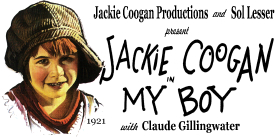

Jackie Coogan Productions, First National
CAST: Jackie Coogan (Jackie Blair), Claude Gillingwater (Captain
Bill), Mathilde Brundage (Mrs. J. Montague Blair)
Little Jackie Blair is a waif who is arriving in America
on a boat along with a large number of other immigrants. Unfortunately,
his father was killed during the war, and his mother died after
they were out to sea. At Ellis Island, an old sea captain shows
him a little kindness, and when good fortune helps him slip past
the authorities out onto the street, he follows the captain home.
Captain Bill dislikes children, but he agrees to let the boy stay
one night. However, the boy endears himself to the captain so
well that he is allowed to stay. Meanwhile, the wealthy Mrs. J.
Montague Blair has received a letter from her daughter-in-law
- who was Jackie's mother. Mrs. Blair apparently disapproved of
her son's marriage and, sick and broke, Jackie's mother was trying
to bring him to America in hopes the grandmother would take them
in. When Mrs. Blair learns the boy is missing from Ellis Island,
she initiates a search for him. Mrs. Blair has funded a party
for children at a local settlement house that Jackie attends;
however, she doesn't realize this is her grandson. When her pocketbook
is found to be missing, a policeman is called to search the children.
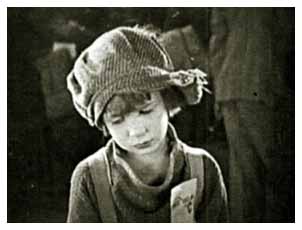 Jackie has something under his
shirt and runs. He arrives home to find an immigration official
who wants to deport him. In a few moments, the policeman arrives,
which all of the children and Mrs. Blair, to arrest the boy. The
boy is cleared of the crime when it is learned that the bulge
is something else, and the pocketbook is found. However, when
the immigration official mentions the boy's name, Mrs. Blair suddenly
realizes this is her grandson.
Jackie has something under his
shirt and runs. He arrives home to find an immigration official
who wants to deport him. In a few moments, the policeman arrives,
which all of the children and Mrs. Blair, to arrest the boy. The
boy is cleared of the crime when it is learned that the bulge
is something else, and the pocketbook is found. However, when
the immigration official mentions the boy's name, Mrs. Blair suddenly
realizes this is her grandson.
After being catapulted to stardom with Chaplin's "The Kid," which was released in January 1921, a wise choice was made to put Jackie Coogan in the role of a well-known and popular character - "Peck's Bad Boy." The "Peck's Bad Boy" stories had been appearing in newspapers since the 1870's and continued their popularity after writer George Wilbur Peck's death in 1916. The familiar precursor to Dennis the Menace was perfect for Jackie. This playful film was a far cry from "The Kid," but it put the little star in a different role - more lighthearted and comedic, but with a solid enough storyline - so that there was no obvious attempt to continue (and cash in on) his character in "The Kid."
But for his third film - "My Boy" - there was, indeed, a reversion to the portrayal of a heart-tugging little street urchin we saw in "The Kid" as Jackie portrays a young immigrant who lost his father in the war - an American and the son of a wealthy family. He also lost his mother while only two days out on their voyage to America. Apparently the grandmother disowned her son when he married, so the boy and his mother were destitute and sailing to America in hopes of now finding some favor with the grandmother. Jackie is wearing the same outfit he wore in "The Kid," and he is given ample opportunity to shed tears and elicit our pity once again.
The story begins with the young orphan on a boat along with dozens of other immigrants. He is sad and mopes about the deck by himself sitting down wherever he can with his one little tattered bag of belongings, head tilted to one side looking despondent.
After the boat's arrival at Ellis Island, we are introduced to Captain Bill - an old, gray-bearded sailor who apparently stops by the port on a regular basis to see if there's any work available. Of course, there's not as we are led to believe he's too old to be of any use - and our second pitiful character is introduced.
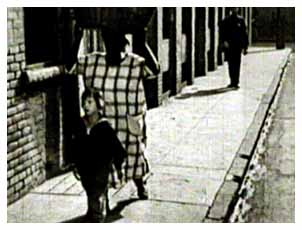 We quickly learn that Bill doesn't
like kids. The eight siblings of one immigrant family are running
around and having a good time, but as they scurry by Bill, he
sneers, "If I had my say, I'd keep those kids out of here!"
However, when a couple of the immigration authorities mention
that the boy will be deported, Bill's compassion begins to show.
He walks over to the sad-faced loner, takes him by the arm, and
places him among the other children as they play "ring around
the Rosie."
We quickly learn that Bill doesn't
like kids. The eight siblings of one immigrant family are running
around and having a good time, but as they scurry by Bill, he
sneers, "If I had my say, I'd keep those kids out of here!"
However, when a couple of the immigration authorities mention
that the boy will be deported, Bill's compassion begins to show.
He walks over to the sad-faced loner, takes him by the arm, and
places him among the other children as they play "ring around
the Rosie."
This sets the stage nicely for Jackie to escape deportment. As the mother and father of the large family unite, all 10 of them leave not realizing they have an extra child in tow. They board the streetcar one by one, the father counting off the children as they step aboard. When he realizes he has an extra moppet on hand, he pushes Jackie away, and the child stands watching forlornly as the streetcar pulls away.
As he ambles away, he encounters Captain Bill, but Bill wants nothing to do with him and pushes him away. The story has been a little "heavy" to this point, but we are given some mild humor as Jackie stubbornly follows the Captain home in spite of being told numerous times to go away. At one point when the Captain turns to see if the boy is following him, Jackie does a quick "about face" and walks in the opposite direction, only to change his course as soon as the Captain's back is turned. At one point to avoid being detected, he jumps quickly behind a barrel on the street just as the Captain turns to look.
Finally, at his house, the Captain grudgingly allows the boy to stay for one night with the understanding he must leave the next day. Of course, the boy quickly ingratiates himself to the old man working around the house and doing all he can to care for the Captain - and ends up being a permanent fixture.
Although lightweight - and the ending is no surprise - the storyline works well. We are somewhat anxious throughout wondering when the authorities will catch up with the boy and under what circumstances. We are also anxious because the grandmother has now instituted a search for the boy. The wealthy grandmother is introduced at her large home early on in the story. She has received a letter that was written by Jackie's mother before she died. Delivered after the boat had docked, it tells of the father's death, her bad health, and their destitute situation. "I am risking the trip in the hope that you will take to your heart your little grandson," she writes. Having been informed by the immigration authorities that the boy is missing, the grandmother tells her attorney to begin the search.
Meanwhile, the story continues to entertain, and the boy continues to endear himself to us, as well. A very neatly constructed situation arises when the Captain is down with rheumatism and needs to have a prescription filled. The doctor adds that he needs nutritious food, as well. Unfortunately, the Captain cannot afford the medicine or the food. Jackie slips the prescription into his pocket and goes out in hopes of finding some way to get the much-needed medicine.
He runs across an organ grinder and his monkey and watches as people gather around and throw money on the sidewalk. Jackie decides that he can make money in much the same way. He moves several feet away and begins to sing and dance. He's a hit, and several people drop money into his hat. The organ grinder is delighted, playing the organ while Jackie dances. However, when everyone leaves, the organ grinder picks up the hat and takes all the money. "All I want is my share," Jackie pleads while showing him the prescription, but the man waves the boy away. After stopping the organ grinder several times and pleading unsuccessfully, he points to something down the street. As the organ grinder turns to look the other way, Jackie grabs the hat full of money and runs. The man lays the organ down with the monkey attached by a leash and gives chase. This is a delightful sequence as Jackie runs up some steps to a porch out of the man's reach, darts in and out of open doorways and generally outsmarts the organ grinder. After eluding the man, Jackie returns to where the organ and monkey have been left behind, takes the portion of the money that he feels is his share, and gives the rest to the monkey with the instruction, "Give this to your father."
Obviously the Captain is pleasantly surprised when the boy
returns with the medicine, and we are treated to one more comedic
moment before this episode ends. There are two medicines in the
bag, and Jackie accidentally gives Bill a spoonful of the liniment
instead of the oral medicine!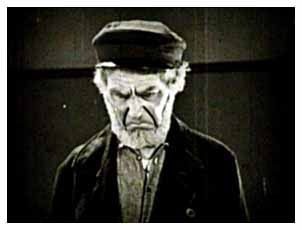
As expected, paths will cross and destinies will come together in the cinematic world. Coincidentally, the grandmother, Mrs. Blair, is sponsoring a party at the settlement house for the children in Jackie's neighborhood. Jackie receives his ticket to the party when he encounters Mrs. Blair and the lady in the charge of the settlement house while walking down the street one day. Of course, Mrs. Blair does not realize this is her grandson.
The party sets the stage for the climactic sequence, and we are not disappointed as the story gives us an energetic and touching conclusion. At the party, Jackie has been eyeing the food in the other room, but he is told to stay away until the appropriate time. Mrs. Blair leaves her purse in that room and later discovers that it is missing. A cop is called off the street, and the kids are lined up to be searched. Jackie is shown trying to hold something under his shirt, and when it comes his time to be searched, he runs. The chase is on - including the cop and all the kids from the party.
While this is going on, an immigration officer has shown up at Captain Bill's - he knows the child has been staying there. As complications multiply, it's great fun trying to figure out how this conundrum is going to resolve itself.
Reviews of the film were positive. Harrison's Reports (December 31, 1921) said, "It is a deeply human story . . . 'My Boy' is far superior to 'Peck's Bad Boy,' . . . from an appealing, as well as entertaining, point of view . . ." Variety (January 6, 1922) proclaimed, "'My Boy' will chalk up a hit with any kind of an audience anywhere in the world."
Jackie was in for his share of praise, too. Picture Play
(April 1922) said, "'My Boy' spills over occasionally with
sentiment but Jackie doesn't spill with it." Harrison's
Reports said, "This picture should help endear little
Jackie Coogan to picture-goers still more. His acting is natural."
Photoplay (March 1922) said,
"Those who said that Jackie Coogan was just a kid with a
trick should see his latest stellar film. The wonder child of
celluloid gives a beautiful performance, in a touching, if trite,
little tale. He amuses you and he makes you cry; if that is not
art, what is?" And Variety added its praise, "They
say that Chaplin taught little Jackie Coogan to act before the
camera. Maybe he did, and if so, Jackie hasn't forgotten. In 'My
Boy,' . . . Jackie is the same wistful, lovable kid, still unspoiled,
who looks directly into the eyes of the actors who play opposite
to him.
Jackie's career was off to a roaring start, and it was quickly becoming evident that he wasn't dependent on Chaplin to be his Svengali. At only seven years old, he not only proved that he could be cute and appealing, but that he could act, as well. At only seven years old, he performs with confidence, controlled emotion and gestures, and appears to have the timing of a veteran. The chase, as in a Chaplin film, is ballet-like in its rhythm, and tears roll genuinely and believably. Jackie made 17 more films during the silent era, and although most would be considered saccharine, weak stories, the presence of Jackie - even as he entered those awkward, early teenage years - ensured that they made money. As has been well documented, Jackie never got to enjoy any of his earnings in adulthood as a result of the mismanagement and squandering of his fortune by his parents.
Claude Gillingwater is acceptable as the Captain. The tall, slender, gray-haired old gentleman is perfect as an old grouch - his chiseled face in a constant grimace. However, he doesn't do as well when sentimentality is called for. At 51 years old, Gillingwater appeared much older than he was. "My Boy" was only his third film. He had just finished making "Little Lord Fauntleroy" with Mary Pickford and was destined for a long and successful career in pictures that lasted through 92 films until his death (by suicide) in 1939.
"My Boy" is well staged. The cinematography is
good with believable scenes on the deck of the boat, as well as
sets for both Ellis Island and the Captain's 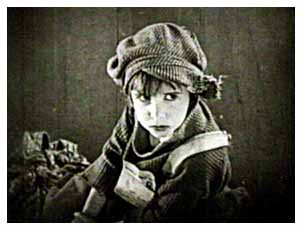 neighborhood
that are believable and not cheaply done. This was the first effort
for the newly formed Jackie Coogan Productions that had been set
up to cash in on the popularity of the young actor - and it has
an impressive look. The production costs were kept reasonable
by a story that required a small cast and few sets. Jackie and
the Captain are the entire story with minimal support from Mathilde
Brundage as Mrs. Blair and a few other minor roles. Jackie, the
Captain and Mrs. Blair are the only three characters identified
in the credits. A small part is played by an unidentified actor
referred to as Captain Davy. He is a friend of Captain Bill's
who comes by occasionally and is the only one taken into Bill's
confidence.
neighborhood
that are believable and not cheaply done. This was the first effort
for the newly formed Jackie Coogan Productions that had been set
up to cash in on the popularity of the young actor - and it has
an impressive look. The production costs were kept reasonable
by a story that required a small cast and few sets. Jackie and
the Captain are the entire story with minimal support from Mathilde
Brundage as Mrs. Blair and a few other minor roles. Jackie, the
Captain and Mrs. Blair are the only three characters identified
in the credits. A small part is played by an unidentified actor
referred to as Captain Davy. He is a friend of Captain Bill's
who comes by occasionally and is the only one taken into Bill's
confidence.
The credits do not tell us who wrote the story, although it has been alternately credited to either Jack Coogan, Sr., or Albert Austin. Austin, the slender, curly-haired actor who played the straight man so well for Chaplin during his Mutual days co-directed the film with Victor Heerman who had a moderately successful career directing from 1916 to 1930, with his most noteworthy film being the Marx Brother's "Animal Crackers" (1930). Austin, on the other hand, did a little more directing during the twenties, but turned mainly to writing through the mid-thirties.
The print reviewed was graciously supplied by ReelClassicDVD.com. The print quality is good, and the contrast is better than average, although there are occasional scratches - which are not distracting. Although this version closes very naturally with all travails satisfactorily resolved, contemporary reviews indicate that little Jackie Blair refused to go live with his grandmother unless Captain Bill could come along, as well - a piece not present in this print. The American Film Institute Catalog lists the film's length at 4,967 feet, which would be somewhere close to 50 minutes depending on film speed. ReelClassicDVD's version runs 53 minutes, so we can only assume the missing portion must be very short, possibly only seconds.
What really makes this film stand out is the original piano score which is performed by Ben Model (http://www.silentfilmmusic.com), an extremely talented silent film accompanist. ReelClassicDVD owner Mark Roth deserves great credit for acknowledging the importance of music to silent film and seeking out professionals to provide original compositions for the films he releases. Anyone who has suffered through a videotape of a silent movie in which a classical recording has been set to play nonstop throughout the entire film will truly appreciate the ReelClassicDVD offerings. Highly recommended, visit his website to check out the great selection of DVD's. Our only hope is that Mr. Roth will continue to expand his offerings.
Copyright 2008 by Tim Lussier. All rights reserved.